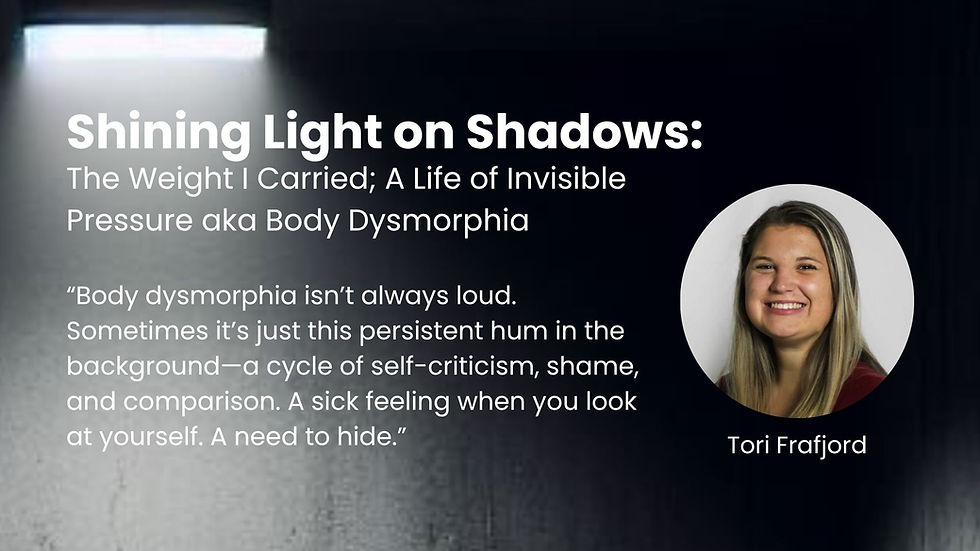Body Dysmorphia Is a Distorted Reality; Unfortunately, It’s My Reality
- Dawn Helmrich

- Jul 31, 2025
- 3 min read
Updated: Aug 11, 2025

The reflection of myself in the mirror shows me a distorted reality. What I see is a two-ton Tessie, an overweight, ugly being. Someone who doesn’t deserve anything. This is body dysmorphia, and it is a real thing. I am constantly comparing myself to other people, often those who are younger and thinner, and prettier than I am. Almost every minute of my day is consumed by thoughts about the way I look and how people perceive me. But I am not vain, my brain is mean to me, and looking at myself in the mirror is like being in a funhouse at an amusement park.
I have been told my whole adult life to just stop thinking that way. But it doesn’t work like that. I grew up in a household where weight was a very important factor, and not being overweight was the standard to live by. So I watch everything I eat, I exercise all the time, and try to keep things under control. That is why menopause has been so terrible for me. Gaining weight is the absolute last thing that someone with body dysmorphia needs. It fuels the fire and the desire to hate myself even further.
None of this is a good thing, and I am woefully aware of the damage I am doing to myself and the harm I have caused my family, especially my daughter, who does not have a healthy perception of body and self because of my poor modeling skills. I work every day to try to fix this obsession that I have with weight, but it is hard. 53 years is a long time to see yourself as not good enough, and trying to change that is very difficult. But I will keep pushing myself to do better.
We will be talking about Body Dysmorphia on Ep. 33 of “Shining Light on Shadows: A Candid Conversation About Mental Health,” Thursday, July 31 at 6pm CT / 7pm ET.
Neil Parekh is my co-host. Tori Frafjord will be our guest. You can watch the live show or recording on Facebook, Twitter*, LinkedIn, YouTube or Instagram*.
*We won't know the exact urls for Twitter or Instagram until we go live on Thursday. For now, these links go to Neil's Twitter and my Instagram.
If you click on the social media links above, and comment, we can put it on screen. You can also just watch the recording or live show right below.
Last month, I was at a sexual assault survivors conference, and the woman sitting next to me was an author. Her name was Cathy Studer, she wrote a series of children’s books, one of them was called Ellie Stops Bullying Herself.
It is all about how Ellie says very bad things about herself and doesn’t like herself very much. I explained to Cathy how I am so mean to myself, and I proceeded to buy the book for me!
Now, when I start to talk badly about myself, my husband will say, “do I have to read you the Ellie book?” and it makes me stop and think and try to redirect my thoughts to positive ideas about myself and not negative ones.
An important lesson in this children’s book is to think about how you would handle the situation if this were your best friend saying these things to themselves and to give yourself the same advice.
Sometimes we say things to ourselves that we would never ever say to anyone else. Trying hard to be kind to ourselves can be very difficult, but in the end, we have to remember that the words we say matter and practicing self-love helps us be a kinder, more loving person to others.






Comments